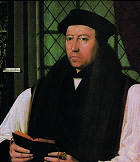 Thomas Cranmer (1489 - 1556)
Thomas Cranmer (1489 - 1556)
Thomas Cranmer, a man of fine theological judgment, was a crucial figure in the separation of the Church of England from the jurisdiction of the Bishop of Rome. His sensitive ear for English was evident in his classic liturgies and prayers that he composed for the "Book of Common Prayers," which greatly shaped English-speaking Christianity for over four centuries. After surviving a harsh schooling, Cranmer proved himself an able student. In 1523 he was ordained a priest and soon gained a reputation as a biblical and patriotic scholar. Cranmer's period of greatest influence came under King Edward VI. Both were deeply concerned for religious unity. His contributions to the "Homilies" were influential among ordinary people and his "Forty-two Articles" provided the Church of England with an authoritative and balanced standard of evangelical and catholic belief. Eventually his defense of Protestant sacramental theology led him to be charged with sedition, tried for treason, and sentenced to death. Cranmer died bravely, being burned on March 21, 1556.